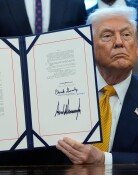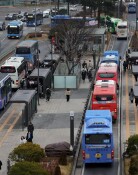Roh Effectively Rejects No-Confidence Motion
Roh Effectively Rejects No-Confidence Motion
Posted September. 07, 2003 23:38,
President Roh Moo-hyun effectively rejected the Assembly`s demand for the dismissal of Government Administration and Home Affairs Minister Kim Doo-kwan on Sunday, saying the passage of the no-confidence bill is an inappropriate tyrannical act.
Meeting with reporters at Cheong Wa Dae, Roh said that since Kim Doo-kwan has participated in administration for the past six months he should be subject to the National Assembly`s inspection and that the dismissal of ministers ahead of the Assembly`s inspection could weaken the inspection. The president`s comments seem to suggest holding on to the home minister until the end of the National Assembly`s inspection of government offices on Oct. 11.
However, the president hinted at the possibility of compromise, saying, "Until the end of the inspection, a little pressure from the Assembly is not a big deal for the government. If the rough relationship between the government and the Assembly prevents the passage of bills or the budget, then we can make a decision."
Regarding the no-confidence motion, the president hinted that he would not accept the resolution easily and that after establishing a kind of system to prevent the Assembly`s right to propose the dismissal of a minister from being misused, he would make a decision on whether to veto it.
"Under the current presidential system, the president has the right to appoint and dismiss cabinet ministers," presidential chief of staff Moon Hee-sang said earlier at a workshop for the presidential secretariat. "Therefore the opposition party`s remarks on infringement on the Constitution by the president shows its attempts to gloss over the issue."
Regarding whether the resolution carries legal binding force, Moon quoted Kim Cheol-su, a law professor at Myongji University as saying in his introduction to the Constitution that the president can reject the resolution if there is a special reason and explained that other constitutionalists, like Hur Young and Kwon Young-sung, interpreted the resolution as not legally binding.
Choe Byung-yul, chairman of the Grand National Party (GNP) retorted that if the president were to act unconstitutionally, it would be a serious problem and that the president must be held responsible.
At a meeting with reporters at the GNP headquarters, Hong Sa-duk, GNP floor leader, contended that they will not let Kim Doo-kwan appear at the National Assembly in the capacity of minister and that there is no choice but to fight with Mr. Roh.
The GNP decided to hold an emergency meeting on Monday to discuss countermeasures.
"Rohs remarks violate checks and balances stipulated in the Constitution and are tantamount to the expression of his will to take a new type of dictatorship," GNP spokesman Park Jin said in a statement. He also issued a warning against Rohs repeated rejection of the no-confidence motion.
Meanwhile, Home minister Kim Doo-kwan indicated Sunday that he would step down after the Chusoek holidays and consider running for the general elections next year after joining the new party being promoted by reform-minded Millennium Democratic Party members.
Appearing on a SBS TV program Sunday, Mr. Kim said, "During the Chuseok holidays, I will meet with fellow lawmakers and talk about national administration and decentralization and then I will unveil my position after the holidays."
He did not rule out any intention to run for the parliament and also said that he wanted to work in the new party currently being formed by MDP lawmakers.







